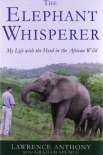The Elephant Whisperer: My Life With the Herd in the African Wild Lawrence Anthony (speld decodable readers txt) 📖

- Author: Lawrence Anthony
Book online «The Elephant Whisperer: My Life With the Herd in the African Wild Lawrence Anthony (speld decodable readers txt) 📖». Author Lawrence Anthony
That didn’t mean we were entirely welcome. A troop of baboons led by a posturing male complained bitterly as they sauntered past for their daily ablutions at the river. We had inadvertently pitched camp slap in the middle of their domain and their fearsome leader had no hesitation in venting his ire. Sitting on top of a Natal mahogany tree, he would show his dagger-shaped yellow teeth and snarl HOOH, HOOH, HAAA across the valley. BOH, BOH, his deep territorial call echoed down the riverbed. To him we would always be trespassers.
It was late spring and birds of all shapes and sizes, feathered in an explosion of African colours, chirped and sang the stories of their lives to all who would listen, while snakes – including the lethal black mamba – sought shade from the baking sun. My favourite was a beautiful rock python that lived in a group of boulders beside a gully. He was still a youngster, less than five feet long, but watching his olive and tan body rippling over the ground was as special as you could get.
I always kept a firm grip on Max’s collar whenever this yard of elastic muscle glided past. Although he had long since learnt not to chase most wild animals, he still had a thing about snakes. Given half a chance he would have been onto the python in a blink.
The Land Rover’s two-way radio aerial also made a great scaffold for a one-inch bark spider that imperiously took up residence. Despite her diminutive size, she was an absolute dynamo. Every evening she strung out her web using the aerial as a support, and every morning she gobbled it all up, saving each precious milligram of protein snared in the gossamer threads, only to rebuild it again at dusk. We named her Wilma and her three-yard-wide web was anengineering marvel, an absolutely formidable, super-sticky trap that seized any flying insect in a grip of silky steel, including four-inch longhorn beetles, which she would methodically suck the life out of.
Sometimes we needed to drive to the far end of the boma and as we started the vehicle she would hang on to her just-completed web in a flat panic at the engine’s vibrations. In the end, we always took pity on her and walked instead.
At dusk, animals that lived in the sun went off to sleep wherever they felt safest. The landscape emptied, but not for long. It was soon repopulated under the light of the African stars by creatures of the night. Warthogs gave way to bush pigs with short, stiletto tusks; tawny and martial eagles were replaced by giant eagle owls that scouted the skies on silent wings, swooping down on vondos, plump oversized bush rats whose sluggish vulnerability is countered only by its prolific breeding capacity. Fiery-necked nightjars with bear-trap mouths customized for snatching insects in mid-flight soaked up the fading heat from the baked ground before soaring into the heavens. Bats, thousands upon thousands, scudded through the air and bushbabies, among the cutest creatures alive with their cuddly looking little bodies and huge eyes screeched raucous mating calls from the treetops.
Hyena, perhaps the most maligned and misunderstood of all Africa’s animals for their unfair reputation of being savage scavengers, but one of my favourites, skulked in the alleys of the dark looking for dinner. YOOUP YOOUP, YOOOOUP they called, marking their territory with their manic cackles. Huge dog-like footprints the next day sometimes showed that they had come in for a closer look at us. We used the spotlight intermittently to track this seething theatre, only because leaving it on for too long lured swarms of bugs that attacked us in squadrons. It’s bad bush practice to keep a light on continuously as light attracts insects,insects attract frogs, and frogs attract snakes. Our only permanent illumination was the campfire.
One morning we woke to find leopard droppings near the Land Rover. The local male had marked his territory right where we were sleeping, delivering a firm feline message – this was also his space.
Living so close to the ground, so to speak, also gave me plenty of time to study the herd and I became fascinated by their individual quirks. Nana, huge and dominant, took her matriarchal duties seriously and like a fussy housewife utilized every inch of the boma’s confines to the maximum. She marked out the best spots for shade, the best shelter from the wind and – uncannily – knew feeding times to the minute. She also knew exactly when the waterhole and mud pond were due to be refilled by us.
Frankie was the herd’s self-appointed guardian. She delighted in breaking away from the rest and storming past us at full speed, head held high and glaring fiercely just for the hell of it.
Mandla, Nana’s baby boy, was a born clown whose antics kept us endlessly amused. Full of bravado he would regularly mock-charge us – just as long as his mum was close by.
Mabula and Marula, Frankie’s thirteen-year-old son and eleven-year-old daughter were always quiet and well behaved, seldom straying far from their mother.
Nandi, Nana’s teenage daughter and mirror image, was much more independent and would often wander around exploring on her own.
And then there was Mnumzane, the young bull and son of the previous matriarch who had been demoted from crown prince to pariah after his mother’s demise. He was no longer part of the herd’s inner circle and spent most of his time alone or on the periphery of the group. This wasthe eons-old elephant way; herds are fiercely feminized and once a male approaches puberty he is evicted.





Comments (0)